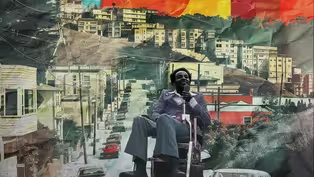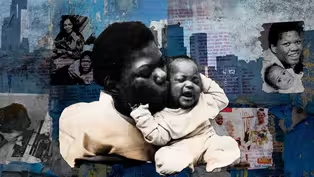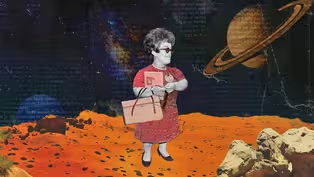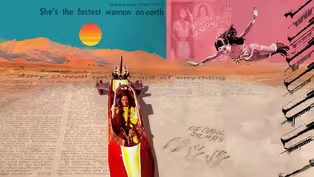
Daniel K. Inouye: Life of Service
Special | 12m 41sVideo has Audio Description
Explore the story of the U.S. Senator for Hawai’i who championed the cause of justice and equality.
Explore the story of the U.S. Senator for Hawai’i who was injured in battle during World War II, resulting in the amputation of his right arm. Posthumously awarded the Presidential Medal of Freedom for his lifelong public service, Inouye championed the cause of justice and equality for all Americans, including people living with disabilities.
See all videos with Audio DescriptionADProblems playing video? | Closed Captioning Feedback
Problems playing video? | Closed Captioning Feedback
Support for American Masters is provided by the Corporation for Public Broadcasting, AARP, Rosalind P. Walter Foundation, Judith and Burton Resnick, Blanche and Hayward Cirker Charitable Lead Annuity Trust, Koo...

Daniel K. Inouye: Life of Service
Special | 12m 41sVideo has Audio Description
Explore the story of the U.S. Senator for Hawai’i who was injured in battle during World War II, resulting in the amputation of his right arm. Posthumously awarded the Presidential Medal of Freedom for his lifelong public service, Inouye championed the cause of justice and equality for all Americans, including people living with disabilities.
See all videos with Audio DescriptionADProblems playing video? | Closed Captioning Feedback
How to Watch American Masters
American Masters is available to stream on pbs.org and the free PBS App, available on iPhone, Apple TV, Android TV, Android smartphones, Amazon Fire TV, Amazon Fire Tablet, Roku, Samsung Smart TV, and Vizio.
Buy Now
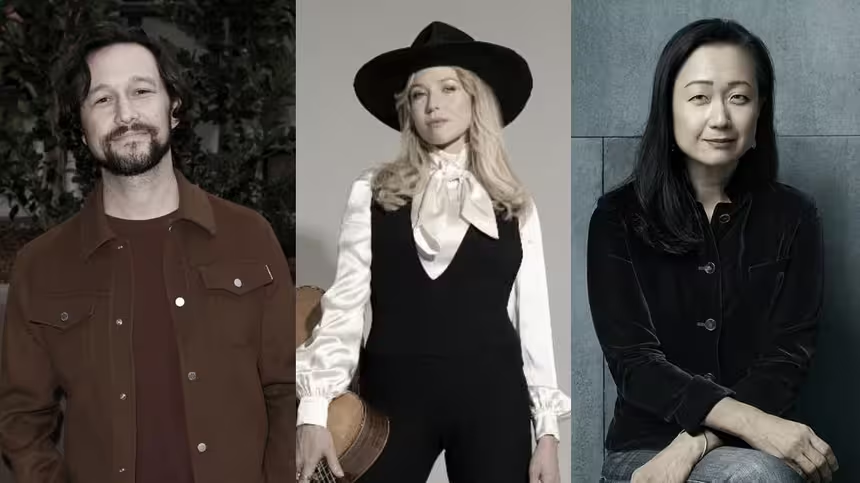
A front row seat to the creative process
How do today’s masters create their art? Each episode an artist reveals how they brought their creative work to life. Hear from artists across disciplines, like actor Joseph Gordon-Levitt, singer-songwriter Jewel, author Min Jin Lee, and more on our podcast "American Masters: Creative Spark."Providing Support for PBS.org
Learn Moreabout PBS online sponsorshipMore from This Collection
Explore the lives of diverse, lesser-known historical figures with disabilities, exploring not only their impact on and contributions to U.S. society, but also the concept of disability culture, which honors the uniqueness of disability. Hosted and narrated by the musician and disability rights advocate Lachi.
Brad Lomax: Creating Communities of Care
Video has Audio Description
Explore Brad Lomax’s under-reported contributions to the early disability justice movement. (10m 19s)
Thomas Wiggins: Composing the Future
Video has Audio Description
The story of a composer and pianist known as one of the greatest musicians of the 19th century. (13m 31s)
Celestine Tate Harrington: Building a Legacy
Video has Audio Description
The story of a disabled street musician who fought for parental rights. (13m 3s)
Judy-Lynn del Rey: The Galaxy Gal
Video has Audio Description
Explore the story of a woman with dwarfism who revolutionized the world of science fiction writing. (12m 36s)
Kitty O'Neil: The Fastest Woman in the World
Discover "the fastest woman in the world," deaf racecar driver and daredevil Kitty O'Neil. (8m 55s)
Providing Support for PBS.org
Learn Moreabout PBS online sponsorship- Aloha, this is Senator Dan Inouye reporting to you from Washington.
- He was the eldest son, one of the first in the family to go to college.
[Robert Stodden]: He was disabled in World War II.
- He was a really big picture thinker.
- He was an important person in my life.
- You can tell how important he was to like, all Hawaians.
- He always defined himself as equal to.
- Children of such progress demand to be heard when they become aware of inequities still to be corrected.
[Tender piano] - One in four American adults have a disability and I'm one of them.
I'm Lachi, I'm a recording artist and disability culture advocate, and I'm here to introduce you to disabled renegades.
♪ I face each day ♪ as a renegade ♪ [Tranquil instrumentals] [Lachi]: Daniel Ken Inouye was born in 1924, the first-born son of Japanese American immigrants in Honolulu, Hawai.
- Their household was actually very typical of Japanese American households of the time.
You know, you had folks who had immigrated from Japan and they've put down roots here in America.
Children were taught to appreciate their ancestral culture, but at the end of the day, these folks considered themselves American.
[Lachi]: Throughout his early life, Inouye struck a balance between his heritage and his identity as an American, always seeing himself as equal to.
That was until one fateful day in 1941.
[Sirens wail] [Ken Inouye]: They're listening to the radio and with horror, they're hearing, "This is not a drill.
This is not a test."
You know, "We are under attack."
[Dan Inouye]: "The Japs are bombing Pearl Harbor, it's not an exercise."
So I went out and all of a sudden, three planes flew right overhead.
Gray...red dots.
The world had come to an end, my world.
- Everything that they'd been working towards to become Americans, to become considered as Americans, and along with the ships at Pearl going up in smoke, their dreams were going up in smoke.
- He tried to enlist, but it wasn't like, the easiest for him.
- He had to overcome the classification designated for enemy aliens.
[Grand instrumentals] [Dan Inouye]: We petitioned the White House, "Please let us serve."
In 1943, an Executive Order was issued forming this regiment.
[Lachi]: As he felt it was his patriotic duty, Inouye was among the first in line to enlist in the 442nd segregated Japanese American combat unit and quickly rose through the ranks.
In one grueling battle, as he led his troops, he took three hits, one ripping through his right arm.
- That part I remember very vividly, because I knew I had the grenade in my hand.
And so here I am scrambling, looking for the grenade.
I figured it fell.
No, it was clenched in my fist.
And so I pried it out and threw it.
Went right in.
[Lachi]: Though publicly, Inouye played down the impact of his amputation, privately, there was a reckoning.
- I used to play the saxophone and clarinet, but that was out of the question.
[Ken Inouye]: All his life, he wanted to either be a surgeon or a musician.
Now he's dealing with the reality that he is down one arm.
He is depressed.
He asked for a cigarette.
The nurse comes.
She has this pack of cigarettes, puts them right down on his chest.
He's thinking to himself, "Well, how am I going to open this?"
So he managed to get one up to his lips.
He goes, "Damn it, I need a light."
This is the point where he kind of goes, [Imitating Dan] "At this point, I was getting a little bit upset."
[Laughter] Takes the pack of matches off of his chest.
As she's talking to him, she's flipping the flap of the matchbook open with her thumb, folding the match over.
She strikes the match and she gives him this big smile.
[Dan Inouye]: They gave me confidence.
I left the hospital full of hope.
I can conquer the world.
- He would talk a lot to us about his rehabilitation and being so grateful so that when he left, he was self-confident and could do anything and take on anything, but never perceived himself as disabled.
- So he basically did not identify as a person with a disability.
- He really didn't.
I think he did feel somewhat awkward about talking about being disabled in an environment where he saw thousands of his own buddies killed and disabled.
He said, you know, "It changed my whole life."
He ended up going to law school.
Law school led him into legal work and then eventually into politics.
[Lachi]: With that pivot, Inouye began campaigning in 1959 to become the first U.S. Representative from the new state of Hawai.
- They're having a rally and the next thing you know, all these people come in to disrupt it, calling them communists and traitors.
My dad kind of decided that he had enough of this and he got up on the mic and he said, "I gave this arm to fight fascism."
And he goes, "I will gladly give this arm to fight communism."
Whenever he would tell that story, when my mom was around, she goes, "My God, I was horrified when he did that."
[Laughter] [Calm instrumentals] [Lachi]: Inouye won that seat and soon after was elected to the United States Senate.
Still, throughout his career, he led an interesting dance when it came to policy and disability.
Huh.
"Disabled angry with Inouye."
- He was always supportive of disability legislation, but he was never the champion.
[Stodden]: You had to really look to know that he had a disability.
You're lobbying for funds for people with disabilities.
You would think, "Oh, this is a great match in the Senate to find somebody with a disability that I can work with."
But there was nothing like that.
- He said definitions are everything.
How you define something is very key.
If you were labeled as disabled then, it was considered kind of a given that you somehow were less.
- Well, disability, particularly at that time and today to some extent, carries a negative connotation.
It's a "dis."
It's a "can't," "you can't," basically.
- Well, I know that society often puts people with disabilities in boxes, right?
And they can sometimes kind of relegate folks' accomplishments to their disability.
This prefix "dis," which doesn't necessarily mean negative, it could mean set apart.
- The attitude that the community has now of, "I am not less than.
I am equal to," you know, to me is very much grounded in that sense of saying, "I'm not disabled.
- Right.
- "I just don't have an arm.
This doesn't change what I can do.
This doesn't change what I am able to bring to the table or to this community."
[Camera shutter clicks] - The days and months following December the 7th, 1941, were sad and tragic ones.
Americans of Japanese ancestry were looked upon as being untrustworthy, treasonous, and unworthy citizens.
Finally, the President of the United States declared that Americanism was a matter of mind and heart and was never a matter of skin or color.
I wish to thank the Department of the Army for this high distinction and high honor.
Thank you very much.
[Applause] Now that we're off the record, that's not my platoon.
[Audience laughs] They're all bunched up!
[Laughter] [Sabas]: His gang was a veteran community.
Those that suffered loss in defense of our country, that was really where he was.
He was known as being a champion for those without voice.
- Sure.
- And those that were discriminated against and in his own way, right, attempted to right those wrongs.
- This is a bill that should have been passed, not this year, not last year, but 10, 20, 50 years ago.
When the bill passes, it will be a victory for the people of the United States.
[Crowd chants] [Lachi]: Inouye's sense of "equal to" extended far beyond his sense of self.
Rising to the national scene in 1964, he championed the Civil Rights Act, then Civil Liberties in 1968, and continued to fight for the free exercise of religion, women's rights, and protection for veterans and people with disabilities.
- The marching feet of youth have led us into a new era of politics, and we can never turn back.
[Applause] [Striking instrumentals] [Lachi]: In 1979, Inouye introduced the Commission on Wartime Relocation and Internment of Civilians, eventually resulting in the Civil Liberties Act of 1988, which provided an apology and reparations to Japanese American internees of World War II.
- Probably one of the greatest skills the Senator had was he saw the world in relational terms as opposed to transactional terms.
- Okay.
Right.
- And I think that that really helped Hawai, because it gave Hawai much more leverage in terms of making an impact than might otherwise have been the case.
- He seemed really connected to his constituents.
- He was.
- Very much an everyman.
- Very much so.
His campaign sticker was just "Dan."
[Lachi laughs] - Really!
- The greatest gift that he gave all of us is confidence.
The confidence to know that we could do anything.
We could compete with anybody.
We could sit across the table and do good by the state.
[Lachi]: Inouye's own confidence, that sense of "equal to," sustained him through five decades of service in Congress.
He continued to rise in standing and recognition, receiving citations for his distinguished civilian and wartime service.
[Applause] [Gentle instrumentals] [Ken Inouye]: To be able to get elected to office in local government, get elected to office in the U.S. government, rise up in stature in the Senate to the point that he is the president pro tem, which is third in line to the president.
Only in America is that possible.
[Dan Inouye]: Whatever success I've had, I share with all of you.
I hope I've lived up to your expectations.
This is Senator Dan Inouye from Washington.
Aloha and goodbye.
[Tender piano] ♪ And the road can ♪ get lonely, cold ♪ ♪ And feel like the ♪ darkest nights ♪ ♪ But the path was paved ♪ ♪ I'm not afraid ♪ ♪ I bring the light ♪ ♪ I live my life ♪ ♪ My rules, my way ♪ ♪ I have no fears ♪ ♪ I face each day ♪ as a renegade ♪ ♪ I don't think twice ♪ ♪ My mind is made ♪ ♪ I don't complain ♪ ♪ I face each day ♪ as a renegade ♪ [Clap]
Support for PBS provided by:
Support for American Masters is provided by the Corporation for Public Broadcasting, AARP, Rosalind P. Walter Foundation, Judith and Burton Resnick, Blanche and Hayward Cirker Charitable Lead Annuity Trust, Koo...

